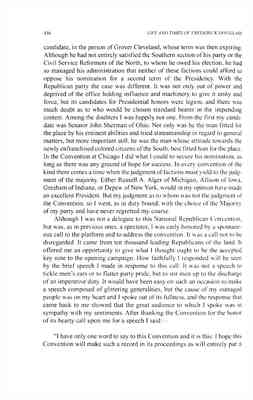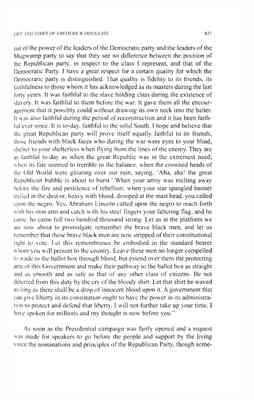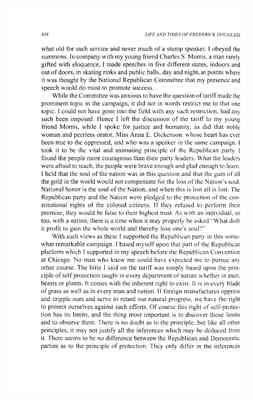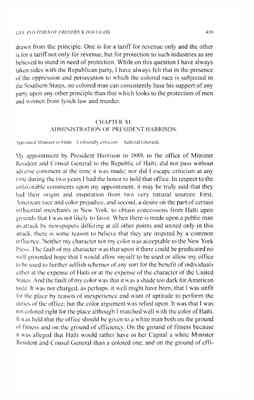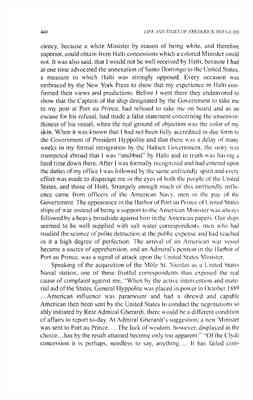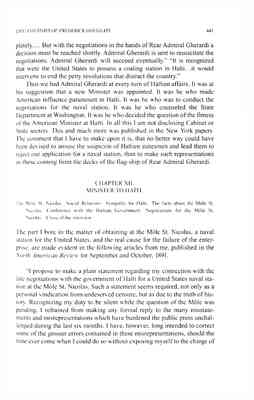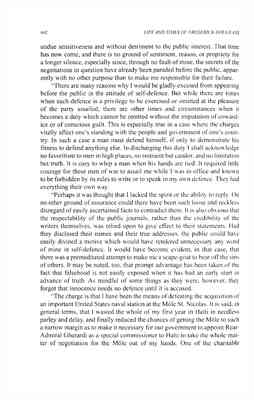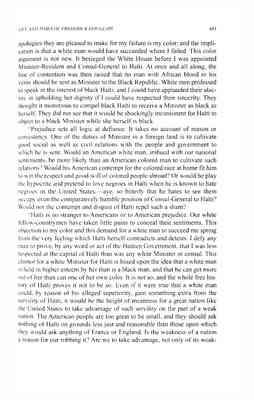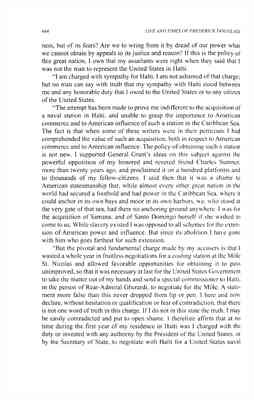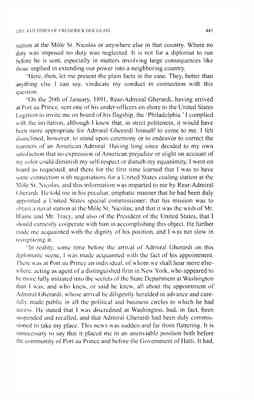Pages That Need Review
Life and Times, Third Part
62
436 LIFE AND TIMES OF FREDERICK DOUGLASS
candidate, in the person of Grover Cleveland, whose term was then expiring. Although he had not entirely satisfied the Southern section of his party or the Civil Service Reformers of the North, to whom he owed his election, he had so managed his administration that neither of these factions could afford to oppose his nomination for a second term of the Presidency. With the Republican party the case was different. It was not only out of power and deprived of the office holding influence and machinery to give it unity and force, but its candidates for Presidential honors were legion, and there was much doubt as to who would be chosen standard bearer in the impending contest. Among the doubters I was happily not one. From the first my candidate was Senator John Sherman of Ohio. Not only was he the man fitted for the place by his eminent abilities and tried statesmanship in regard to general matters, but more important still, he was the man whose attitude towards the newly enfranchised colored citizens of the South, best fitted him for the place. In the Convention at Chicago I did what I could to secure his nomination, as long as there was any ground of hope for success. In every convention of the kind there comes a time when the judgment of factions must yield to the judgment of the majority. Either Russell A. Alger of Michigan, Allison of Iowa, Gresham of Indiana, or Depew of New York, would in my opinion have made an excellent President. But my judgment as to whom was not the judgment of the Convention, so I went, as in duty bound, with the choice of the Majority of my party and have never regretted my course.
Although I was not a delegate to this National Republican Con\ention. but was, as in previous ones, a spectator, I was early honored by a spontaneous call to the platform and to address the convention. It was a call not to be disregarded. It came from ten thousand leading Republicans of the land. It offered me an opportunity to give what I thought ought to be the accepted key note to the opening campaign How faithfully I responded will be seen by the brief speech I made in response to this call. It was not a speech to tickle men's ears or to flatter party pride, but to stir men up to the discharge of an imperative duty. It would have been easy on such an occasion to make a speech composed of glittering generalities, but the cause of my outraged people was on my heart and I spoke out of its fullness, and the response that came back to me showed that the great audience to which I spoke was in sympathy with my sentiments. After thanking the Convention for the honor of its hearty call upon me for a speech I said:–
"I have only one word to say to this Convention and it is this: I hope this Convention will make such a record in its proceedings as will entirely put it
63
LIFE AND TIMES OF FREDERICK DOUGLASS 437
out of the power of the leaders of the Democratic party and the leaders of the Mugwump party to say that they see no difference between the position of the Republican party, in respect to the class I represent, and that of the Democratic Party. I have a great respect for a certain quality for which the Democratic party is distinguished. That quality is fidelity to its friends, its faithfulness to those whom it has acknowledged as its masters during the last forty years. It was faithful to the slave holding class during the existence of slavery. It was faithful to them before the war. It gave them all the encouragement that it possibly could without drawing its own neck into the halter. It was also faithful during the period of reconstruction and it has been faithful ever since. It is to-day, faithful to the solid South. I hope and believe that the great Republican party will prove itself equally faithful to its friends, those friends with black faces who during the war were eyes to your blind, shelter to your shelterless when flying from the lines of the enemy. They are as faithful to-day as when the great Republic was in the extremest need; when its fate seemed to tremble in the balance; when the crowned heads of the Old World were gloating owr our ruin, saying, 'Aha, aha! the great Republican bubble is about to burst.' When your army was melting away before the tire and pestilence of rebellion; when your star spangled banner trailed in the dust or, heavy with blood, drooped at the mast head, you called upon the negro. Yes, Abraham Lincoln called upon the negro to reach forth with his iron arm and catch with his steel fingers your faltering flag, and he came, he came full two hundred thousand strong. Let us in the platform we are now about to promulgate remember the brave black men, and let us remember that these brave black men are now stripped of their constitutional right to vote. Let this remembrance be embodied in the standard bearer whom you will present to the country. Leave these men no longer compelled to wade to the ballot box through blood, but extend over them the protecting arm of this Government and make their pathway to the ballot box as straight and as smooth and as safe as that of any other class of citizens. Be not deterred from this duty by the cry of the bloody shirt. Let that shirt be waved as long as there shall be a drop of innocent blood upon it. A government that can give liberty in its constitution ought to have the power in its administration to protect and defend that liberty. I will not further take up your time. I have spoken for millions and my thought is now before you."
As soon as the Presidential campaign was fairly opened and a request was made for speakers to go before the people and support by the living voice the nominations and principles of the Republican Party, though some-
64
438 LIFE AND TIMES OF FREDERICK DOUGLASS
what old for such service and never much of a stump speaker, I obeyed the summons. In company with my young friend Charles S. Morris, a man rarely gifted with eloquence, I made speeches in five different states, indoors and out of doors, in skating rinks and public halls, day and night, at points where it was thought by the National Republican Committee that my presence and speech would do most to promote success.
While the Committee was anxious to have the question of tariff made the prominent topic in the campaign, it did not in words restrict me to that one topic. I could not have gone into the field with any such restriction, had any such been imposed. Hence I left the discussion of the tariff to my young friend Morris, while I spoke for justice and humanity, as did that noble woman and peerless orator, Miss Anna E. Dickenson, whose heart has ever been true to the oppressed, and who was a speaker in the same campaign. I took it to be the vital and animating principle of the Republican party. I found the people more courageous than their party leaders. What the leaders were afraid to teach, the people were brave enough and glad enough to learn. I held that the soul of the nation was in this question and that the gain of all the gold in the world would not compensate for the loss of the Nation's soul. National honor is the soul of the Nation, and when this is lost all is lost. The Republican party and the Nation were pledged to the protection of the constitutional rights of the colored citizens. If they refused to perform their promise, they would be false to their highest trust. As with an individual, so too, with a nation, there is a time when it may properly be asked "What doth it profit to gain the whole world and thereby lose one's soul?"
With such views as these I supported the Republican party in this somewhat remarkable campaign. I based myself upon that part of the Republican platform which I supported in my speech before the Republican Convention at Chicago. No man who knew me could have expected me to pursue any other course. The little I said on the tariff was simply based upon the principle of self protection taught in every department of nature whether in men, beasts or plants. It comes with the inherent right to exist. It is in every blade of grass as well as in every man and nation. If foreign manufactures oppress and cripple ours and serve to retard our natural progress, we have the right to protect ourselves against such efforts . Of course this right of self-protection has its limits, and the thing most important is to discover those limits and to observe them. There is no doubt as to the principle, but like all other principles, it may not justify all the inferences which may be deduced from it. There seems to be no difference between the Republican and Democratic parties as to the principle of protection. They only differ in the inferences
65
439 LIFE AND TIMES OF FREDERICK DOUGLASS
drawn from the principle. One is for a tariff for revenue only and the other is for a tariff not only for revenue, but for protection to such industries as are believed to stand in need of protection. While on this question I have always taken sides with the Republican party. I have always felt that in the presence of the oppression and persecution to which the colored race is subjected in the Southern States, no colored man can consistently base his support of any party upon any other principle than that which looks to the protection of men and women from lynch law and murder.
CHAPTER XI. ADMINISTRATION OF PRESIDENT HARRISON.
Appointed Minister to Haïti. Unfriendly criticism. Admiral Gherardi.
My appointment by President Harrison in 1889, to the office of Minister Resident and Consul General to the Republic of Haïti, did not pass without adverse comment at the time it was made; nor did I escape criticism at any time during the two years I had the honor to hold that office. In respect to the unfavorable comments upon my appointment, it may be truly said that they had their origin and inspiration from two very natural sources: First, American race and color prejudice, and second, a desire on the part of certain influential merchants in New York, to obtain concessions from Haïti upon grounds that I was not likely to favor. When there is made upon a public man an attack by newspapers differing at all other points and united only in this attack, there is some reason to believe that they are inspired by a common influence. Neither my character nor my color was acceptable to the New York Press. The fault of my character was that upon it there could be predicated no well grounded hope that l would allow myself to be used or allow my office to he used to further selfish schemes of any sort for the benefit of individuals either at the expense of Haïti or at the expense of the character of the United States. and the fault of my color was that it was a shade too dark for American taste. It was not charged, as perhaps, it well might have been, that I was unfit for the place by reason of inexperience and want of aptitude to perform the duties of the office; but the color argument was relied upon. It was that I was not colored right for the place although I matched well with the color of Haïti. It was held that the office should be given to a white man both on the ground or fitness and on the ground of efficiency. On the ground of fitness because it was alleged that Haïti would rather have in her Capital a white Minister Resident and Consul General than a colored one; and on the ground of effi-
66
440 LIFE AND TIMES OF FREDERICK DOUGLASS
ciency, because a white Minister by reason of being white, and therefore superior, could obtain from Haïti concessions which a colored Minister could not. It was also said, that I would not be well received by Haïti, because I had at one time advocated the annexation of Santo Domingo to the United States, a measure to which Haïti was strongly opposed. Every occasion was embraced by the New York Press to show that my experience in Haïti confirmed their views and predictions. Before I went there they endeavored to show that the Captain of the ship designated by the Government to take me to my post at Port au Prince, had refused to take me on board and as an excuse for his refusal, had made a false statement concerning the unseaworthiness of his vessel, when the real ground of objection was the color of my skin. When it was known that I had not been fully accredited in due form to the Government of President Hyppolite and that there was a delay of many weeks in my formal recognition by the Haïtien Gmernment, the story was trumpeted abroad that I was "snubbed" by Haïti and in truth was having a hard time down there. After I was formally recognized and had entered upon the duties of my office I was followed by the same unfriendly spirit and every effort was made to disparage me in the eyes of both the people or the United States, and those of Haïti . Strangely enough much or this unfriendly influence came from officers of the American Navy, men in the pay of the Government. The appearance in the Harbor of Port au Prince of United States ships of war instead of being a support to the American Minister was always followed by a heavy broadside against him in the American papers. Our ships seemed to be well supplied with salt water correspondents, men who had studied the science of polite detraction at the public expense and had reached in it a high degree of perfection. The arrival of an American war vessel became a source of apprehension, and an Admiral's pennon in the Harbor of Port au Prince, was a signal of attack upon the United States Minister.
Speaking of the acquisition of the Môle St. Nicolas as a United States Naval station, one of these fruitful correspondents thus exposed the real cause of complaint against me. "When by the active intenention and material aid of the States, General Hyppolite was placed in power in October 1889 ... American influence was paramount and had a shrewd and capable American then been sent by the United States to conduct the negotiations so ably initiated by Rear Admiral Gherardi, there would be a different condition of affairs to report to-day. At Admiral Gherardi 's suggestion, a new Minister was sent to Port au Prince.... The lack of wisdom, however, displayed in the choice... has by the result attained become only too apparent." "Of the Clyde concession it is perhaps, needless to say, anything.... It has failed com-
67
LIFE AND TIMES OF FREDERICK DOUGLASS 441
pletely.... But with the negotiations in the hands of Rear Admiral Gherardi a decision must be reached shortly. Admiral Gherardi is sent to resuscitate the negotiations. Admiral Gherardi will succeed eventually." "It is recognized that were the United States to possess a coaling station in Haïti... it would intervene to end the petty revolutions that distract the country."
Thus we had Admiral Gherardi at every turn of Haïtien affairs. It was at his suggestion that a new Minister was appointed. It was he who made American influence paramount in Haïti. It was he who was to conduct the negotiations for the naval station. It was he who counseled the State Department at Washington. It was he who decided the question of the fitness of the American Minister at Haïti. In all this I am not disclosing Cabinet or State secrets. This and much more was published in the New York papers. The comment that I have to make upon it is, that no better way could have heen devised to arouse the suspicion of Haïtien statesmen and lead them to reject our application for a naval station, than to make such representations as these coming from the decks of the flag-ship of Rear Admiral Gherardi.
CIIAPTER XII. MINISTER TO HAÏTI.
The Môle St. Nicolas. Social Relations. Sympathy for Haïti. The facts about the Môle St. Nicolas. Conference with the Haïtian Government. Negotiations for the Môle St. Nicolas. Close of the interview.
The part I bore in the matter of obtaining at the Môle St. Nicolas, a naval station for the United States, and the real cause for the failure of the enterprise, are made evident in the following articles from me, published in the North American Review for September and October, 1891.
"I propose to make a plain statement regarding my connection with the late negotiations with the government of Haïti for a United States naval station at the Môle St. Nicolas. Such a statement seems required. not only as a personal vindication from underserved censure, but as due to the truth of history. Recognizing my duty to be silent while the question of the Môle was pending. I refrained from making any formal reply to the many misstatements and misrepresentations which have burdened the public press unchallenged during the last six months. I have, however, long intended to correct some of the grosser errors contained in these misrepresentations, should the time ever come when I could do so without exposing myself to the charge of
68
442 LIFE AND TIMES OF FREDERICK DOUGLASS
undue sensitiveness and without detriment to the public interest. That time has now come, and there is no ground of sentiment, reason, or propriety for a longer silence, especially since, through no fault of mine, the secrets of the negotiations in question have already been paraded before the public, apparently with no other purpose than to make me responsible for their failure.
"There are many reasons why I would be gladly excused from appearing before the public in the attitude of self-defence. But while there are times when such defence is a privilege to be exercised or omitted at the pleasure of the party assailed, there are other times and circumstances when it becomes a duty which cannot be omitted without the imputation of cowardice or of conscious guilt. This is especially true in a case where the charges vitally affect one's standing with the people and government of one's country. In such a case a man must defend himself, if only to demonstrate his fitness to defend anything else. In discharging this duty I shall acknowledge no favoritism to men in high places, no restraint but candor, and no limitation but truth. It is easy to whip a man when his hands are tied. It required little courage for these men of war to assail me while I was in office and known to be forbidden by its rules to write or to speak in my own defence. They had everything their own way.
"Perhaps it was thought that I lacked the spirit or the ability to reply. On no other ground of assurance could there have been such loose and reckless disregard of easily ascertained facts to contradict them. It is also obvious that the respectability of the public journals, rather than the credibility of the writers themselves, was relied upon to give effect to their statements. Had they disclosed their names and their true addresses, the public could have easily divined a motive which would have rendered unnecessary any word of mine in self-defence. It would have become evident, in that case, that there was a premeditated attempt to make me a scape-goat to bear off the sins of others. It may be noted, too, that prompt advantage has been taken of the fact that falsehood is not easily exposed when it has had an early start in advance of truth. As mindful of some things as they were, however, they forgot that innocence needs no defence until it is accused.
"The charge is that I have been the means of defeating the acquisition of an important United States naval station at the Môle St. Nicolas. It is said, in general terms, that I wasted the whole of my first year in Haïti in needless parley and delay, and finally reduced the chances of getting the Môle to such a narrow margin as to make it necessary for our government to appoint RearAdmiral Gherardi as a special commissioner to Haiti to take the whole matter of negotiation for the Môle out of my hands. One of the charitable
69
LIFE AND TIMES OF FREDERICK DOUGLASS 443
apologies they are pleased to make for my failure is my color; and the implication is that a white man would have succeeded where I failed . This color argument is not new. It besieged the White House before I was appointed Minister-Resident and Consul-General to Haïti. At once and all along, the line of contention was then raised that no man with African blood in his veins should be sent as Minister to the Black Republic. White men professed to speak in the interest of black Haïti; and I could have applauded their alacrity in upholding her dignity if I could have respected their sincerity. They thought it monstrous to compel black Haïti to receive a Minister as black as herself. They did not see that it would be shockingly inconsistent for Haïti to object to a black Minister while she herself is black.
"Prejudice sets all logic at defiance. It takes no account of reason or consistency. One of the duties of Minister in a foreign land is to cultivate good social as well as civil relations with the people and government to which he is sent. Would an American white man, imbued with our national sentiments, be more likely than an American colored man to cultivate such relations? Would his American contempt for the colored race at home fit him to win the respect and good-will of colored people abroad? Or would he play the hypocrite and pretend to love negroes in Haïti when he is known to hate negroes in the United Statcs,– aye, so bitterly that he hates to see them occupy even the comparatively humble position of Consul-General to Haïti? Would not the contempt and disgust of Haïti repel such a sham?
"Haïti is no stranger to Americans or to American prejudice. Our white fellow-countrymen have taken little pains to conceal their sentiments. This objection to my color and this demand for a white man to succeed me spring from the very feeling which Haïti herself contradicts and detests. I defy any man to prove, by any word or act of the Haïtien Government, that I was less respected at the capital of Haïti than was any white Minister or consul. This clamor for a white Minister for Haïti is based upon the idea that a white man is held in higher esteem by her than is a black man, and that he can get more out of her than can one of her own color. It is not so, and the whole free history of Haïti proves it not to be so. Even if it were true that a white man could, by reason of his alleged superiority, gain something extra from the servility of Haïti, it would be the height of meanness for a great nation like the United States to take advantage of such servility on the part of a weak nation. The American people are too great to be small, and they should ask nothing of Haïti on grounds less just and reasonable than those upon which they would ask anything of France or England. Is the weakness of a nation a reason for our robbing it? Are we to take advantage, not only of its weak-
70
444 LIFE AND TIMES OF FREDERICK DOUGLASS
ness, but of its fears? Are we to wring from it by dread of our power what we cannot obtain by appeals to its justice and reason? If this is the policy of this great nation, I own that my assailants were right when they said that I was not the man to represent the United States in Haïti.
"I am charged with sympathy for Haïti. I am not ashamed of that charge; but no man can say with trnth that my sympathy with Haïti stood between me and any honorable duty that I owed to the United States or to any citizen of the United States.
"The attempt has been made to prove me indifferent to the acquisition of a naval station in Haïti, and unable to grasp the importance to American commerce and to American influence of such a station in the Caribbean Sea. The fact is that when some of these writers were in their petticoats I had comprehended the value of such an acquisition, both in respect to American commerce and to American influence. The policy of obtaining such a station is not new. I supported General Grant's ideas on this subject against the powerful opposition of my honored and revered friend Charles Sumner. more than twenty years ago, and proclaimed it on a hundred platlcmns and to thousands of my fellow-citizens. I said then that it was a shame to American statesmanship that, while almost every other great nation in the world had secured a foothold and had power in the Caribbean Sea, where it could anchor in its own bays and moor in its own harbors, we, who stood at the very gate of that sea, had there no anchoring ground anywhere. I was for the acquisition of Samana, and of Santo Domingo herself if she wished to come to us. While slavery existed I was opposed to all schemes for the extension of American power and influence. But since its abolition I have gone with him who goes farthest for such extension.
"But the pivotal and fundamental charge made by my accusers is that I wasted a whole year in fruitless negotiations for a coaling station at the Môle St. Nicolas and allowed favorable opportunities for obtaining it to pass unimproved, so that it was necessary at last for the United States Government to take the matter out of my hands and send a special commissioner to Haïti, in the person of Rear-Admiral Gherardi, to negotiate for the Môle. A statement more false than this never dropped from lip or pen. I here and now declare, without hesitation or qualification or fear of contradiction, that there is not one word of truth in this charge. If I do not in this state the truth, I may be easily contradicted and put to open shame. I therefore affirm that at no time during the first year of my residence in Haïti was I charged with the duty or invested with any authority by the President of the United States, or by the Secretary of State, to negotiate with Haïti for a United States naval
71
LIFE AND TIMES OF FREDERICK DOUGLASS 445
station at the Môle St. Nicolas or anywhere else in that country. Where no duty was imposed no duty was neglected. It is not for a diplomat to run before he is sent, especially in matters involving large consequences like those implied in extending our power into a neighboring country.
"Here, then, let me present the plain facts in the case. They, better than anything else I can say, vindicate my conduct in connection with this question.
"On the 26th of January, 1891, Rear-Admiral Gherardi, having arrived at Port au Prince, sent one of his under-officers on shore to the United States Legation to invite me on board of his flagship, the 'Philadelphia.' I complied with the invitation, although I knew that, in strict politeness, it would have been more appropriate for Admiral Gherardi himself to come to me. I felt disinclined, however, to stand upon ceremony or to endeavor to correct the manners of an American Admiral. Having long since decided to my own satisfaction that no expression of American prejudice or slight on account of my color could diminish my self-respect or disturb my equanimity, I went on board as requested, and there for the first time learned that I was to have sume connection with negotiations for a United States coaling station at the Môle St. Nicolas, and this information was imparted to me by Rear-Admiral Gherardi. He told me in his peculiar, emphatic manner that he had been duly appointed a United States special commissioner; that his mission was to obtain a naval station at the Môle St. Nicolas; and that it was the wish of Mr. Blaine and Mr. Tracy, and also of the President of the United States, that I should earnestly coöperate with him in accomplishing this object. He further made me acquainted with the dignity of his position, and I was not slow in recognizing it.
"In reality. some time before the arrival of Admiral Gherardi on this diplomatic scene. I was made acquainted with the fact of his appointment. There was at Port au Prince an individual, of whom we shall hear more elsewhere, acting as agent of a distinguished firm in New York, who appeared to be more fully initiated into the secrets of the State Department at Washington than I was, and who knew, or said he knew, all about the appointment of Admiral Gherardi, whose arrival he diligently heralded in advance and carefully made public in all the political and business circles to which he had access. He stated that I was discredited at Washington, had, in fact, been suspended and recalled, and that Admiral Gherardi had been duly commissioned to take my place. This news was sudden and far from flattering. It is unnecessary to say that it placed me in an unenviable position both before the community of Port au Prince and before the Government of Haïti. It had,
